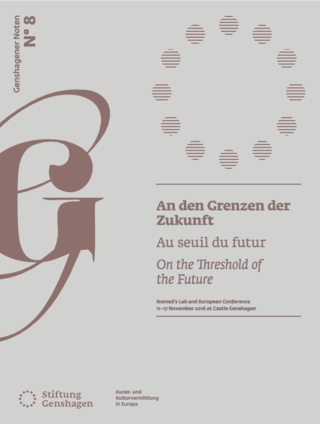English version below
Europejski projekt w cyklu „Na granicach przyszłości” zainicjowany wspólnie z francuskim partnerem Observatoire des politiques culturelles wystartował w Pałacu Genshagen w listopadzie 2016 roku. Tematem projektu jest rola i wkład sztuki, sektora kultury oraz Edukacji Kulturalnej w procesy integracji i partycypacji społecznej. W listopadzie 2016 roku w Fundacji Genshagen spotkali się przedstawiciele instytucji kulturalnych z Francji, Polski, Włoch, Bułgarii i Niemiec, artyści i dorosła młodzież w liczbie 50 osób, aby dyskutować na temat różnorodności, międzykulturowości, Edukacji Kulturalnej i sztuki. W centrum debaty znajdowały się kwestie współkształtowania przez instytucje kulturalne oraz przy udziale młodego pokolenia życia społecznego, dyskusje prowadzone były w wymiarze europejskim.
Celem pierwszego spotkania było stworzenie swoistego rodzaju laboratorium, w którym na poziomie europejskim wypróbowany miał być wizjonerski potencjał sztuki w obliczu dokonujących się społecznych przemian. Ważnym elementem tego laboratorium była próba porównania aktualnej sytuacji w poszczególnych krajach oraz uważne spojrzenie na tę kwestię młodych uczestników. Podczas pierwszego spotkania w ramach laboratorium nomadycznego młodzież z Francji, Polski i Niemiec stworzyła pod kierunkiem choreograf Be van Vark performance taneczny na ten temat. Performance zaprezentowany został uczestnikom na otwarcie konferencji „Na granicach przyszłości”. Podczas konferencji przedstawiciele europejskich instytucji partnerskich dyskutowali z młodymi uczestnikami o ich doświadczeniach w laboratorium nomadycznym, wymieniali poglądy, prezentowali przykłady i planowali dalszy przebieg projektu.
Teksty zebrane w ósmym wydaniu publikacji Genshagener Note stanowią podsumowanie i ewaluację wyników pierwszego nomadycznego laboratorium. W publikacji znaleźć można również francusko-niemiecką perspektywę na kwestie związane z różnorodnością i partycypacją oraz analizę różnych projektów z obszaru Edukacji Kulturalnej dotyczących „dziedzictwa imigracji”. W ostatniej części Genshagener Note przedstawiciele instytucji partnerskich prezentują swoje refleksje na tematy różnorodności i międzykulturowości w odniesieniu do aktualnych zmian w ich krajach.
8th Genshagener Note „On the Threshold of the Future“
The European series of seminars „On the Threshold of the Future“, which has been initiated together with the French partner organization Observatoire des politiques culturelles, started in November 2016 at Genshagen castle. Its main focus lies on the role and contribution of arts, the cultural sector and arts education in societal participation and integration processes. In November 2016 fifty representatives of cultural institutions from France, Poland, Italy, Bulgaria, Morocco and Germany as well as artists, cultural operators and young adults came together at the Genshagen Foundation to discuss questions of diversity, interculturality, cultural education and arts. The main focus of the seminar was on questions of living together in our society and how this can be shaped by cultural institutions – on a European level and together with the young generation.
The aim of the opening seminar has been to create a laboratory situation on a European level, in which the visionary potential of arts is used to examine new ways of living together in view of the background of current societal developments and dynamics. In doing so, a transfer of knowledge and comparison between the participating countries has been central, as well as the artistic and inquiring view of young adults. Therefore, in the first Nomad’s Lab, a trilateral artistic youth exchange project, young adults from France, Poland and Germany developed a dance and theatre performance on this topic under the direction of choreographer Be van Vark. This performance has been presented to the participants of the seminar “On the Threshold of the Future” at the opening of the conference. In the further course of the seminar, representatives of the European partner institutions discussed with the young adults the experiences they made in the Nomad’s Lab, presented their positions on the topic, considered other examples and planned the further course of the project.
The contributions of the eighth “Genshagener Note” firstly summarize and evaluate the results of the first Nomad’s Lab from different angles. Subsequently, a description of the German-French perspective on questions of diversity and participation as well as an analysis of different cultural projects regarding the concept of “heirs to immigration” is given. In the last part of the eighth “Genshagener Note” the representatives of the European partner organizations describe their positions on the topics of diversity and interculturality with reference to current developments in arts education in their respective countries.
